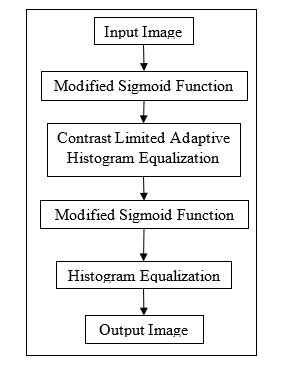An Efficient Adaptive Algorithm for Electron Microscopic Image Enhancement and Feature Extraction
Objective
The objective of this project is to develop an efficient adaptive algorithm for electron microscopic image enhancement and feature extraction. The algorithm will aim to improve the visual quality and extract meaningful features from electron microscopic images, which are commonly used in biological research and medical diagnosis.
Abstract
In this article, a block-based adaptive contrast enhancement algorithm has been proposed, which uses a modified sigmoid function for the enhancement and features extraction of electron microscopic images. The algorithm is based on a modified sigmoid function that adapts according to the input microscopic image statistics. For feature extraction, the contrast of the image is very important and authentic property by which this article enhances the visual quality of the image. In this work, for better contrast enhancement of image, a block based on input value, combined with a modified sigmoid function that is used as contrast enhancer provides better EMF values for a smaller block size. It provides localized contrast enhancement effects adaptively which is not possible using other existing techniques. Simulation and experimental results demonstrate that the proposed technique gives better results compared to other existing techniques when applied to electron microscopic images. After the enhancement of microscopic images of actinomycetes, various important features are shown, like coil or spiral, long filament, spore and rod shape structures. The proposed algorithm works efficiently for different dark and bright microscopic images.
Keywords: Adaptive Histogram Equalization, EMF Values, Image Enhancement, Modified Sigmoid Function
NOTE: Without the concern of our team, please don't submit to the college. This Abstract varies based on student requirements.
Block Diagram

Specifications
Software: Matlab 2018a or above
Hardware:
Operating Systems:
· Windows 10
· Windows 7 Service Pack 1
· Windows Server 2019
· Windows Server 2016
Processors:
Minimum: Any Intel or AMD x86-64 processor
Recommended: Any Intel or AMD x86-64 processor with four logical cores and AVX2 instruction set support
Disk:
Minimum: 2.9 GB of HDD space for MATLAB only, 5-8 GB for a typical installation
Recommended: An SSD is recommended A full installation of all MathWorks products may take up to 29 GB of disk space
RAM:
Minimum: 4 GB
Recommended: 8 GB
Learning Outcomes
· Introduction to Matlab
· What is EISPACK & LINPACK
· How to start with MATLAB
· About Matlab language
· Matlab coding skills
· About tools & libraries
· Application Program Interface in Matlab
· About Matlab desktop
· How to use Matlab editor to create M-Files
· Features of Matlab
· Basics on Matlab
· What is an Image/pixel?
· About image formats
· Introduction to Image Processing
· How digital image is formed
· Importing the image via image acquisition tools
· Analyzing and manipulation of image.
· Phases of image processing:
o Acquisition
o Image enhancement
o Image restoration
o Color image processing
o Image compression
o Morphological processing
o Segmentation etc.,
· How to extend our work to another real time applications
· Project development Skills
o Problem analyzing skills
o Problem solving skills
o Creativity and imaginary skills
o Programming skills
o Deployment
o Testing skills
o Debugging skills
o Project presentation skills
o Thesis writing skills





 Paper Publishing
Paper Publishing
